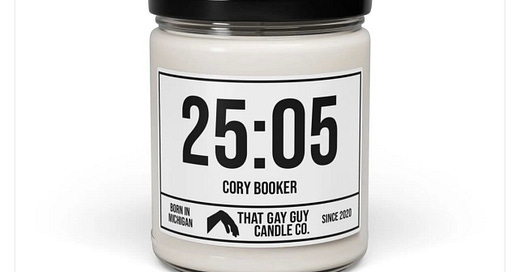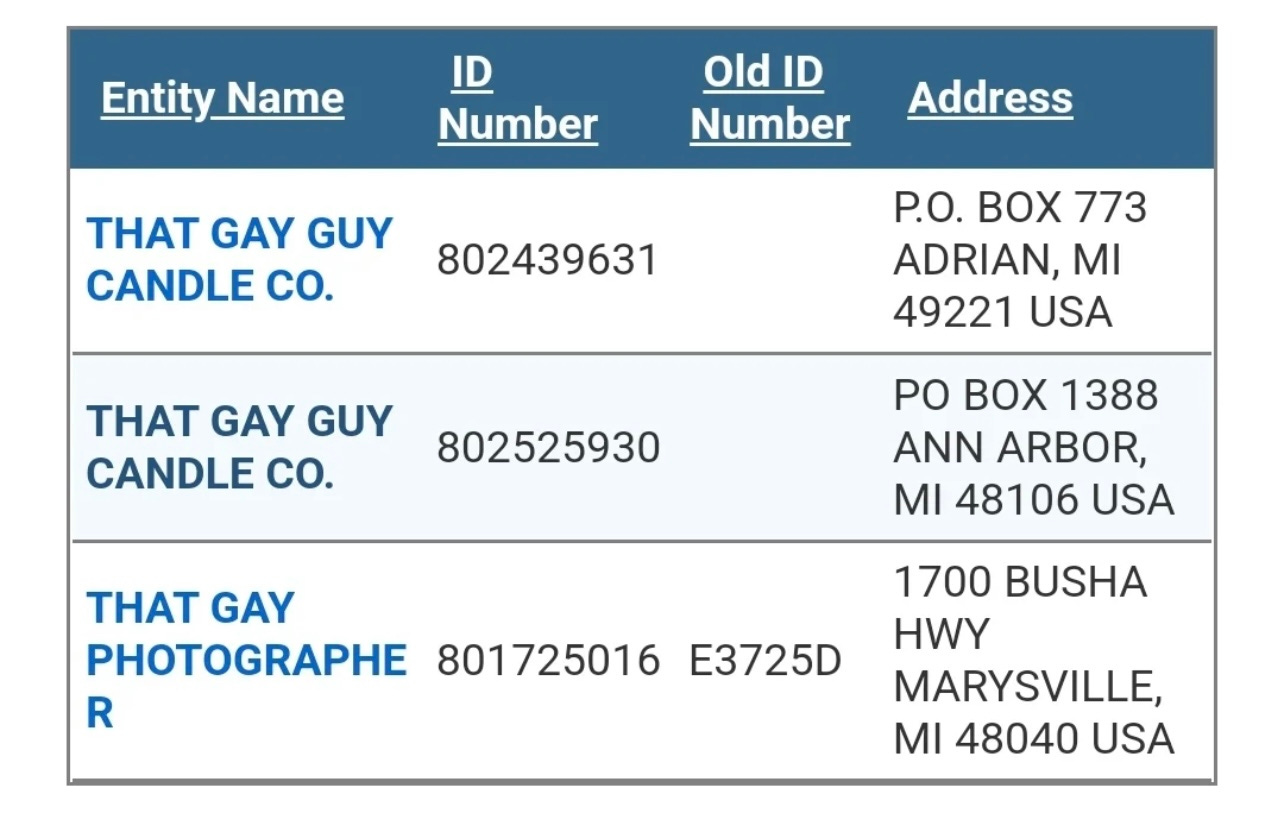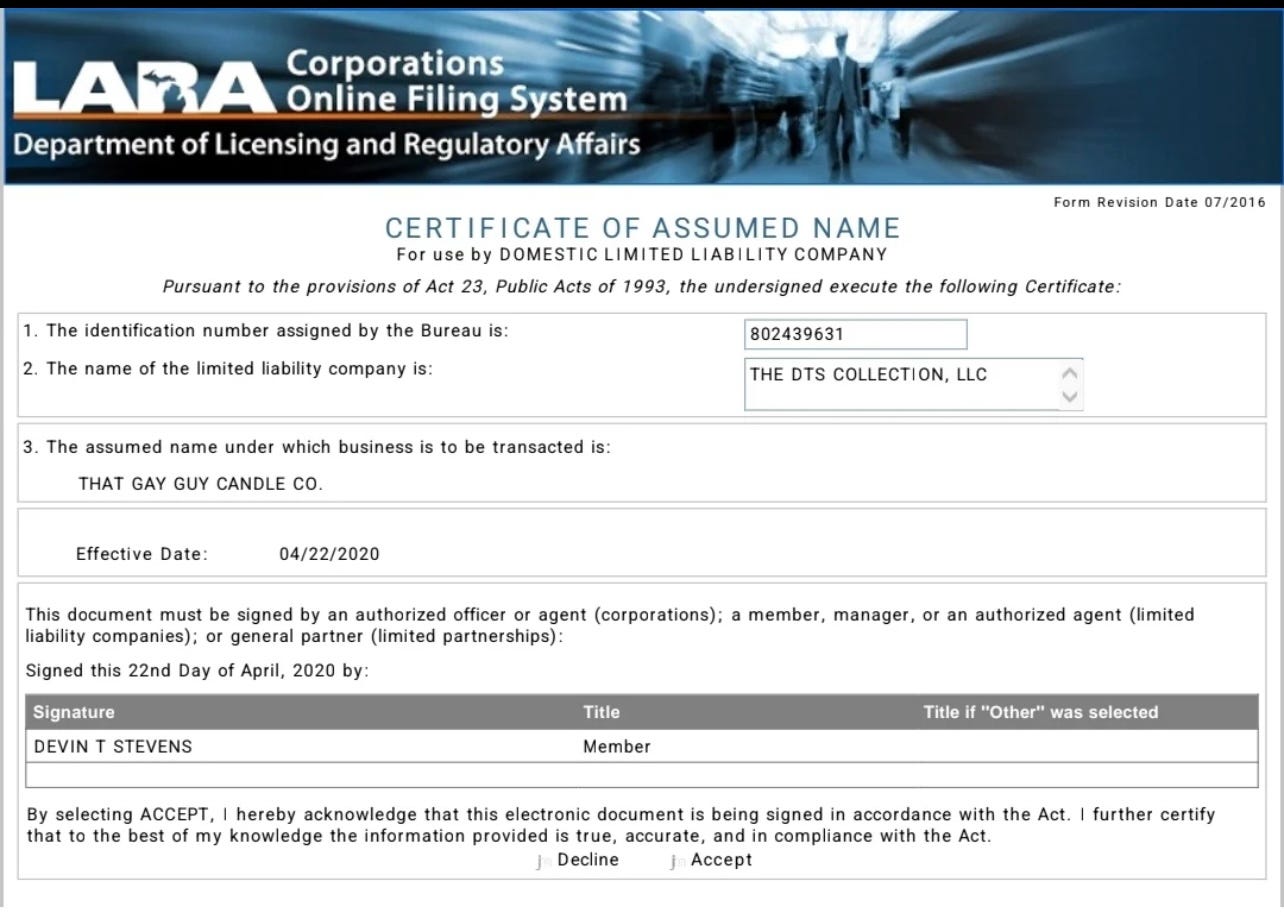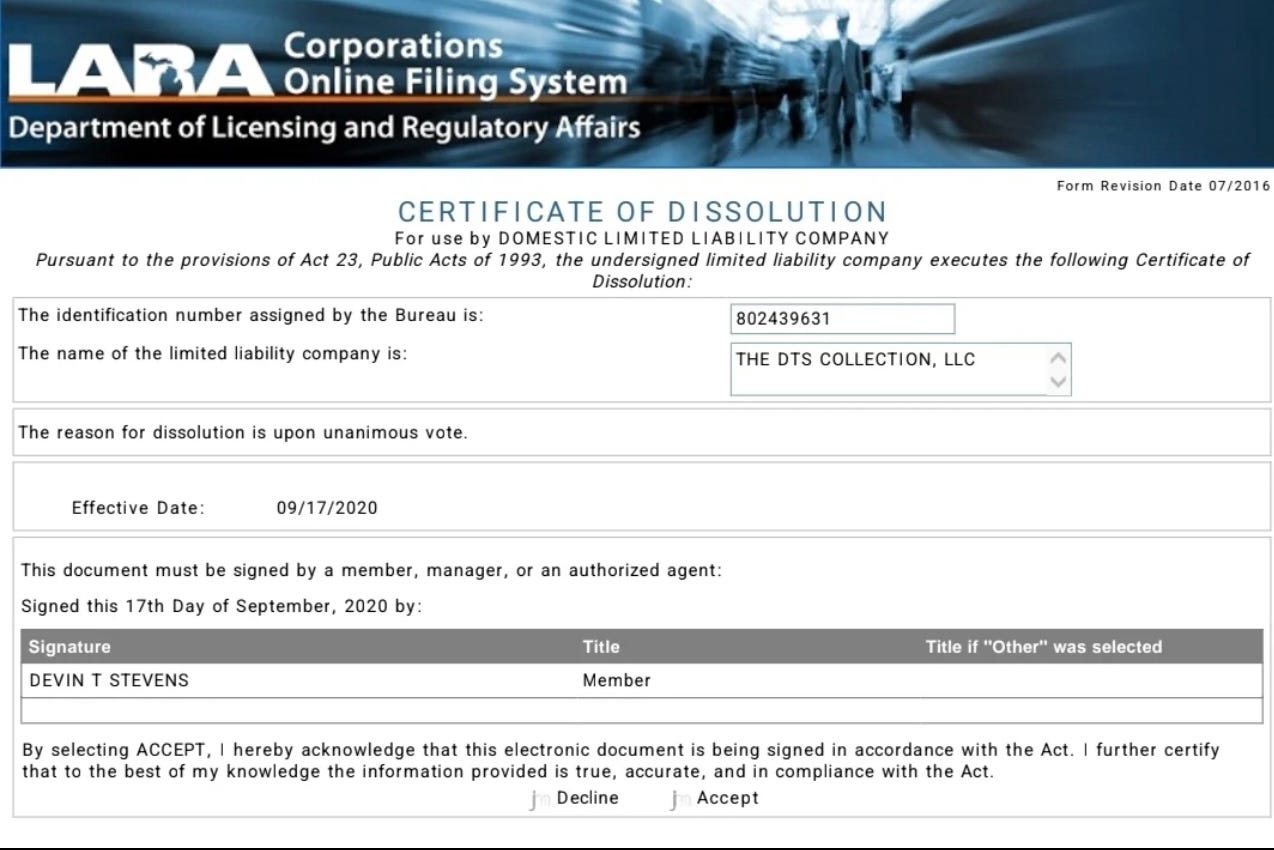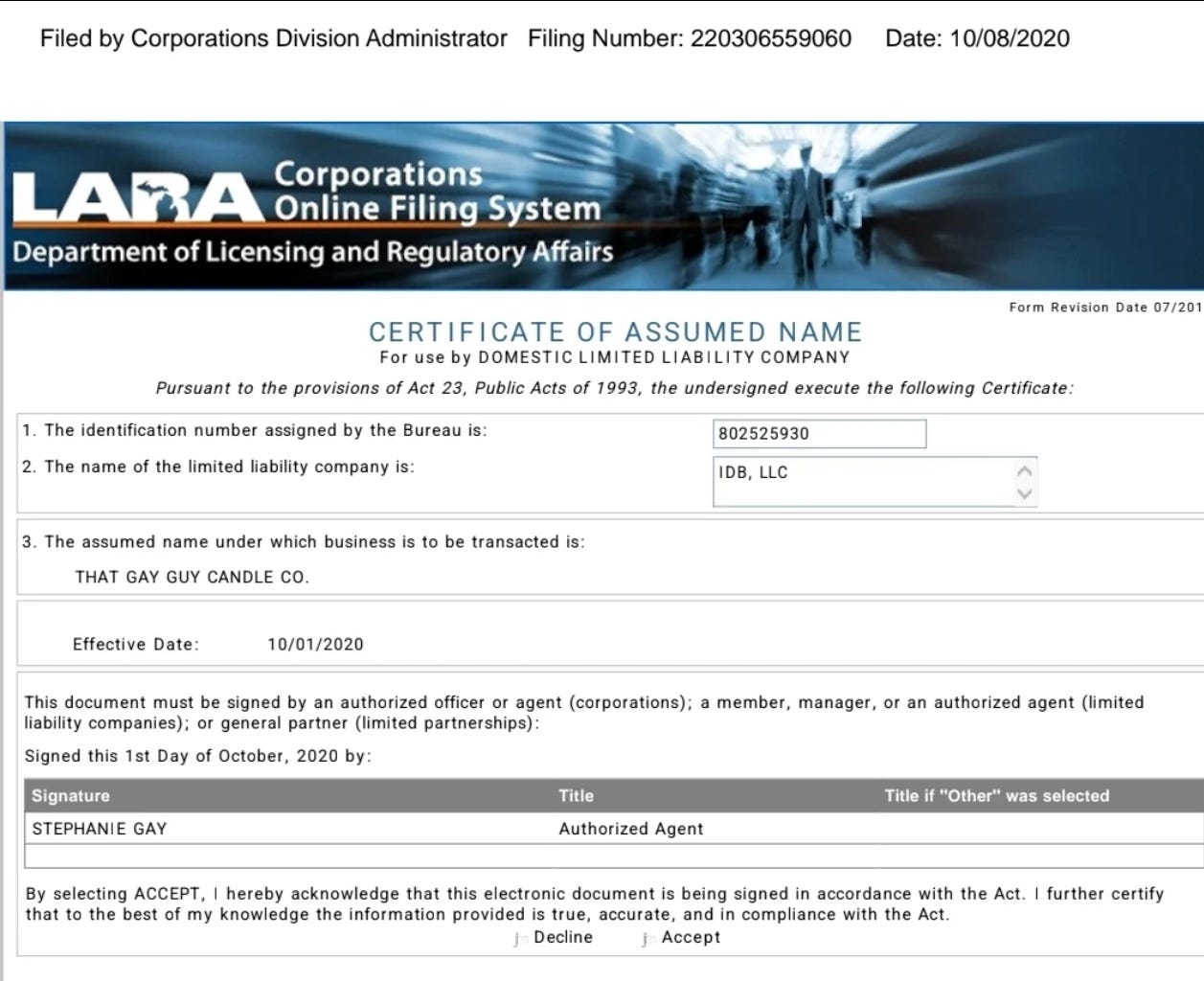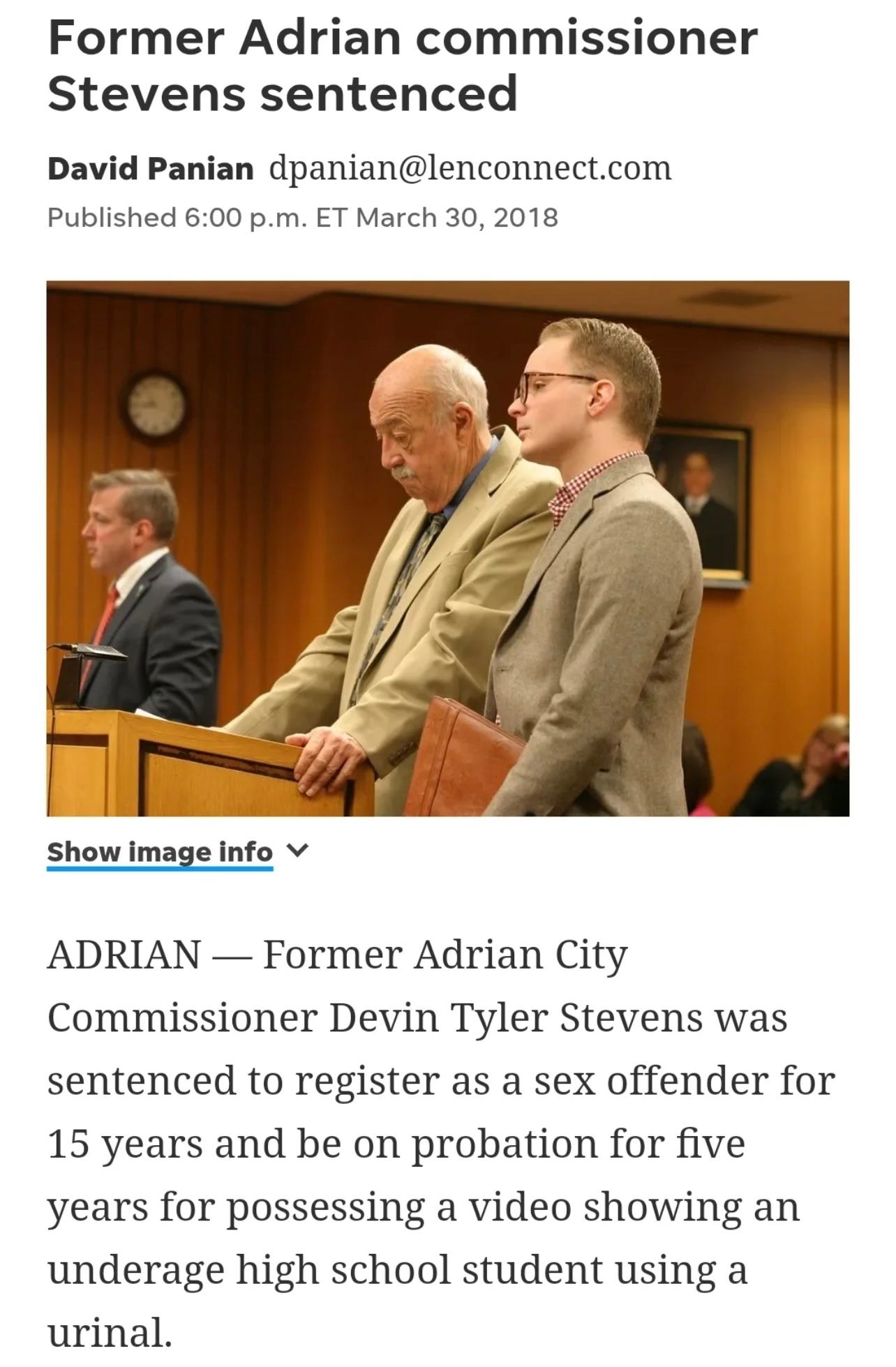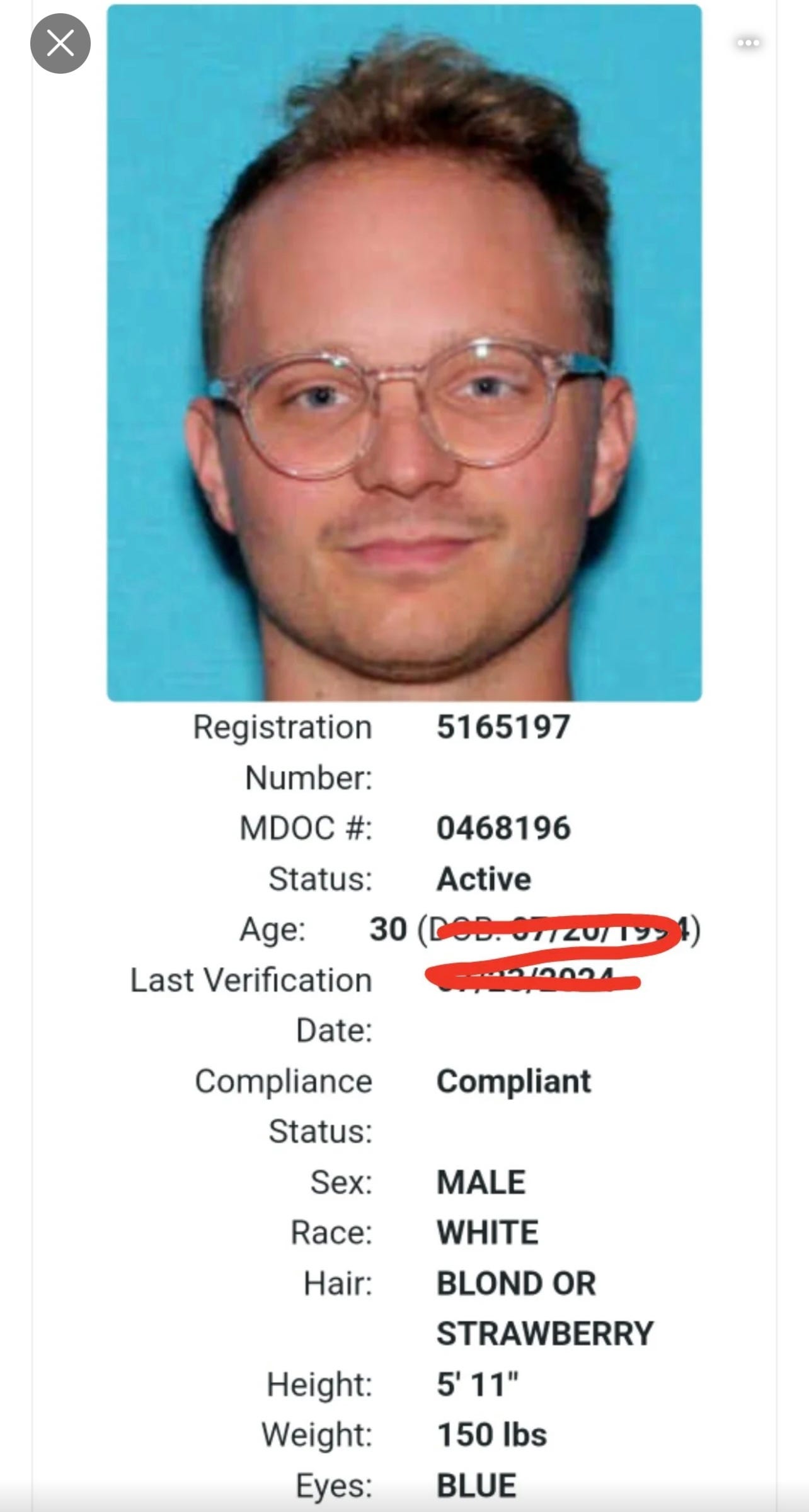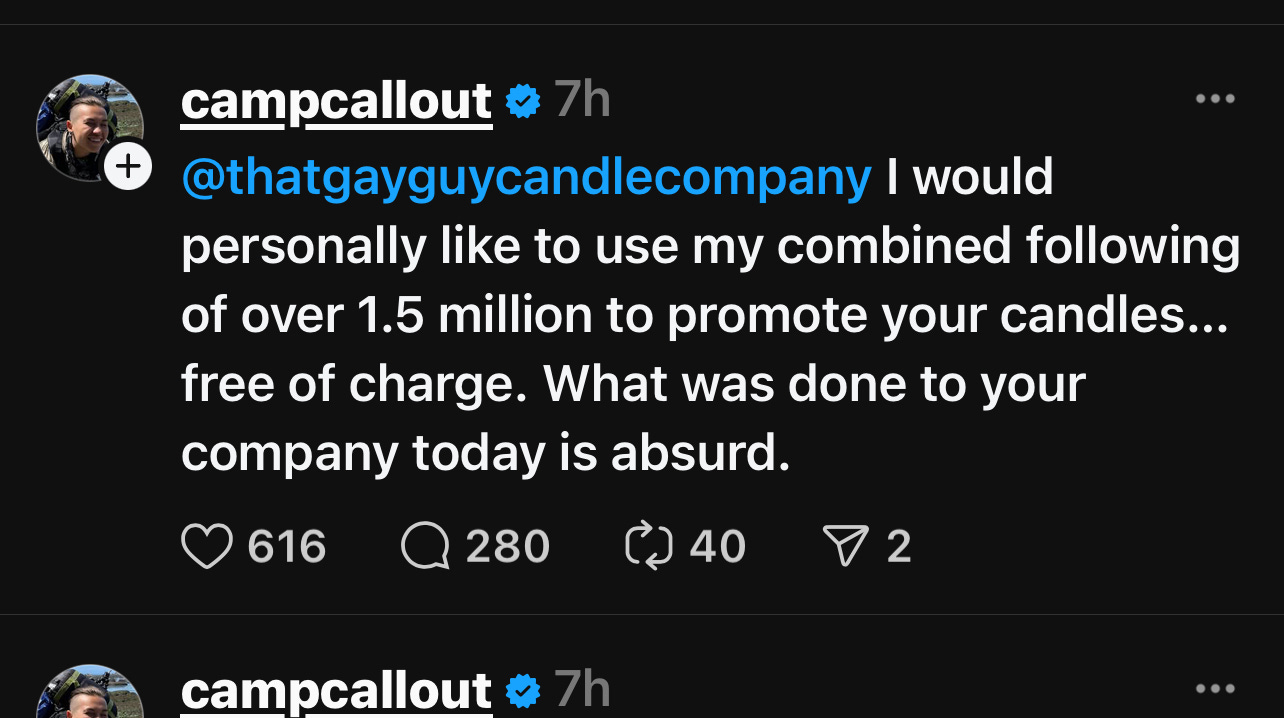In today’s socio-political climate, where brands frequently align themselves with progressive causes to appeal to conscientious consumers, the line between genuine support and opportunistic exploitation often blurs. The recent controversy surrounding That Gay Guy Candle Co. exemplifies how purported allyship can devolve into a commodification of marginalized communities’ struggles, leaving those communities feeling betrayed and unheard.
The Offending Product: A Candle Scented with Racist Marketing
That Gay Guy Candle Co., an LGBTQ+-owned brand known for its cheeky and politically themed products, recently released a candle named “25:05 Cory Booker.” This product was ostensibly designed to honor Senator Cory Booker’s record-breaking 25-hour and 5-minute speech in the U.S. Senate—a filibuster intended to protest policies detrimental to marginalized communities. However, the choice of scent—“Clean Cotton”—was not just a misstep; it was a glaring act of insensitivity that underscores a profound disconnect from the historical and cultural contexts of the Black experience.
Cotton is not merely a fabric or a neutral scent; it is an enduring symbol of the brutal history of slavery and the exploitation of Black bodies in America. The cotton fields represent centuries of forced labor, systemic oppression, and unimaginable suffering endured by enslaved Africans and their descendants. By associating a Black senator’s commendable achievement with the scent of cotton, That Gay Guy Candle Co. inadvertently invoked painful memories of a dark past, reducing a legacy of resilience and struggle to a mere marketing gimmick. This careless attempt to profit from Black history under the guise of honor is not only tone-deaf but also emblematic of a broader pattern where Black pain is commodified for commercial gain.
The implications of this decision are profound. It reflects a lack of cultural competency and awareness, suggesting that the company’s creative process lacks the necessary diversity of thought and perspective. In an era where consumers are increasingly holding brands accountable for their cultural and social impact, such oversights are not just PR nightmares—they are indicative of deeper systemic issues within the organization.
From Courtrooms to Candles: The Dark Backstory Behind “That Gay Guy Candle Co.”
As “That Gay Guy Candle Co.” cultivated its social media presence with cheeky branding and polished aesthetics, few would suspect the tangled legal and ethical history behind its formation. Public records from Michigan’s Department of Licensing and Regulatory Affairs (LARA) reveal a complicated chain of entity registrations, dissolutions, and rebrandings—hinting at more than just business strategy.
Initially registered under The DTS Collection, LLC (ID: 802439631), the business operated under the assumed name “That Gay Guy Candle Co.” as of April 22, 2020, with Devin T. Stevens listed as the signing member. However, by September 17, 2020, the LLC was dissolved by unanimous vote—again, signed by Stevens. Less than a month later, the same business name was re-registered under IDB, LLC (ID: 802525930) with Stephanie Gay acting as the authorized agent.
But the paper trail doesn’t end at the Secretary of State’s office.
Devin Tyler Stevens, listed as the founder of the original iteration of the company, is a registered sex offender in the state of Michigan. In 2018, local news outlet The Daily Telegram reported that Stevens, then a former Adrian City Commissioner, was sentenced to register as a sex offender for 15 years and serve five years probation for possession of a video showing a high school student using a urinal.
As of the most recent verification, Stevens remains on the sex offender registry under MDOC #0468196 with an active compliance status.
Despite efforts to rebrand and perhaps bury the past under fresh LLC filings and new agent signatures, the digital footprint of That Gay Guy Candle Co. is laced with troubling history. Consumers and supporters of LGBTQ-owned businesses deserve transparency—especially when a brand uses queer identity as both a marketing tool and a shield.
This revelation isn’t just about legal filings or marketing ethics—it’s about trust, community safety, and who gets to profit from queerness while dragging behind unresolved harm.
Screenshots provided by
The Backlash: Voices from the Black Community
The release of the “25:05 Cory Booker” candle was met with swift and vehement backlash, particularly from Black activists, consumers, and allies who recognized the offensive nature of the product. Social media platforms became arenas for expressing outrage, disappointment, and calls for accountability.
One user on Threads encapsulated the collective disbelief:
“Making a cotton scented candle themed after Cory Booker is WILD.”
Another user highlighted the broader issue of commodifying Black experiences:
“Uplifting a community you are not a part of does not give you the right to capitalize off of their efforts.”
These reactions underscore a critical point: allyship does not grant permission to monetize the struggles of marginalized communities. True support involves amplifying voices, advocating for systemic change, and engaging in actions that benefit the community—not profiting from their historical or ongoing oppression.
The backlash also sheds light on the fatigue experienced by Black individuals who continually witness their pain being repackaged and sold. It’s a painful reminder that, despite progress, the exploitation of Black culture and history remains pervasive. This incident serves as a call to action for brands to move beyond performative gestures and towards genuine, informed, and respectful engagement with the communities they claim to support.
The Owner’s Response: Defensiveness Over Accountability
In the face of mounting criticism, users and consumers alike anticipated a thoughtful and sincere response from That Gay Guy Candle Co.—one that acknowledged the oversight, took responsibility, and outlined steps towards rectification. Unfortunately, the company’s reaction was marked by defensiveness and a troubling dismissal of valid concerns.
On Twitter, the brand’s account sarcastically remarked:
“Racist, token gay. I learn more about myself every day.”
This flippant response not only trivializes the legitimate grievances raised by the Black community but also reflects a refusal to engage in the introspection necessary for genuine allyship. By adopting a defensive posture, the company prioritized its own image over the harm inflicted, further alienating the very community it purportedly aimed to honor.
Such reactions are emblematic of a broader issue where individuals and brands, when confronted with their missteps, choose to center their feelings over the harm they’ve caused. This approach not only exacerbates the situation but also reveals a superficial understanding of allyship—one that is contingent on convenience and devoid of the humility required to acknowledge and learn from mistakes.
Moreover, the company’s failure to issue a formal apology or remove the offensive product from its lineup speaks volumes. It suggests a prioritization of profit over people, of ego over empathy. In an age where consumers are increasingly aligning their spending with their values, such miscalculations can have lasting repercussions on a brand’s reputation and viability.
Enter Camp Callout: Amplifying Harm Under the Guise of Unity
Amid the controversy, an influencer known as Camp Callout, real name Mercedes Chandler, inserted herself into the narrative. Chandler, a self-proclaimed ex-Republican turned leftist activist and humanist, boasts a following of over 1.5 million across platforms. She offered to promote That Gay Guy Candle Co.’s products for free, stating:
“What was done to your company today is absurd.”
Chandler’s intervention is a textbook example of how white allies can sometimes cause more harm than good. By dismissing the valid criticisms from the Black community as “absurd,” she not only invalidated their feelings but also perpetuated a cycle where white voices dictate the legitimacy of Black pain. Her emphasis on avoiding “infighting” within progressive circles further silences marginalized voices under the pretense of unity.
This incident highlights the dangers of performative allyship, where the desire to be seen as supportive eclipses the actual needs and perspectives of the community in question. True allyship requires listening, humility, and a willingness to be held accountable—not rushing to the defense of those who have caused harm simply because they share a broader ideological alignment.
Chandler’s actions serve as a cautionary tale for influencers and allies: the impulse to defend and protect should never come at the expense of the marginalized voices that need amplification. Solidarity is not about shielding each other from criticism but about collectively striving towards justice, even when it requires uncomfortable conversations and acknowledgments of wrongdoing.
The Broader Implications: When Allyship Becomes Exploitation
This incident is not isolated. It reflects a pervasive pattern where brands and individuals appropriate the struggles of marginalized communities for personal or financial gain. The commodification of Black pain, history, and culture is a lucrative business, and it’s often masked as solidarity.
True allyship requires more than performative gestures and surface-level support. It demands:
Listening: Prioritizing the voices and experiences of marginalized communities.
Learning: Educating oneself on the historical and cultural contexts of issues.
Accountability: Owning up to mistakes and making tangible efforts to rectify them.
Action: Supporting initiatives led by marginalized communities without expecting accolades or profit.
When these elements are absent, what remains is exploitation masquerading as support. Don’t let rainbow marketing and allyship merch fool you—capitalism will always try to repackage resistance in a way that centers whiteness.
Historical Parallels: Exploiting Black Struggle for Personal Gain
The exploitation of Black struggle by individuals and institutions for personal, political, or social gain is nothing new. From the founding of this country to modern-day “woke-washing,” history is riddled with examples of white figures—across gender, party, and ideology—who have co-opted Black suffering, resistance, and identity for their own advancement. Whether it’s presidents, suffragettes, or influencers, the playbook remains the same: borrow the language of liberation, reap the rewards of proximity, and abandon the cause when accountability comes knocking.
Let’s take a moment to sit with that history—and name names.
Thomas Jefferson: The Founding Father of Hypocrisy
Thomas Jefferson, the author of “all men are created equal,” was also one of the most prolific enslavers in American history. Let that irony marinate. While drafting lofty ideals about liberty, he was simultaneously building his wealth, status, and legacy off the backs of enslaved Africans—people whose freedom he actively denied, even as he philosophized about it.
Jefferson didn’t just own human beings; he raped one. Sally Hemings, an enslaved teenager, was coerced into a sexual relationship with him and bore at least six of his children. This wasn’t love—it was institutionalized, normalized sexual violence. Jefferson profited from Black labor, Black bodies, and Black silence, all while writing the rules of a democracy that still struggles to recognize Black humanity.
So, when a brand today tries to profit off Black icons like Cory Booker with a cotton-scented candle and calls it “uplift,” understand: this isn’t a new mistake. It’s a recycled one.
Susan B. Anthony and the White Women’s Suffrage Movement: Feminism at the Expense of Black Liberation
Let’s fast-forward to the 19th century and call out another darling of American progressivism: Susan B. Anthony. Yes, she fought for women’s rights—but let’s not pretend her feminism was inclusive.
In the aftermath of the Civil War, as Black men began to gain voting rights under the 15th Amendment, Anthony and many of her fellow white suffragettes lost their damn minds. Rather than standing in solidarity with Black liberation, she threw Black people under the bus, arguing that white women were more deserving of the vote than Black men.
In 1866, Susan B. Anthony co-founded the American Equal Rights Association with Frederick Douglass, but that alliance quickly dissolved when she insisted on prioritizing white women’s suffrage—even at the expense of Black enfranchisement. Her infamous quote speaks volumes:
“I will cut off this right arm of mine before I will ever work or demand the ballot for the Negro and not the woman.”
That’s not solidarity. That’s racial opportunism wrapped in a corset.
And let’s be real: while white women were marching for the vote, it was often Black women who were excluded from the parades, denied a seat at the strategy tables, and used only as moral currency. Names like Sojourner Truth, Ida B. Wells, and Mary Church Terrell were rarely lifted alongside Anthony’s—even though they were organizing, agitating, and risking their lives, too.
The truth is that the white women’s suffrage movement was built on the labor and struggle of Black women—but refused to let them lead. Sound familiar?
This same dynamic plays out today when white feminists, white queers, and white liberals latch onto Black movements or figures for clout, then recoil when Black voices demand accountability or centering. It’s Susan B. Anthony energy—and it’s still everywhere.
Today’s Echoes: From Suffrage to Soy Candles
So when That Gay Guy Candle Co. released a candle named after Cory Booker, paired it with the scent of cotton, and then got defensive when Black folks expressed hurt and outrage—what we witnessed was not a surprising misstep. It was a continuation of a long-standing tradition.
And when Camp Callout, a white influencer with a massive platform, swooped in to “rescue” the brand from criticism, using the language of “no infighting” and offering free promotion? That wasn’t allyship. That was a redux of white saviorism, dressed up in progressive aesthetics and hashtags. Just like Susan B. Anthony, Camp Callout centered white feelings and unity over Black truth and justice.
This isn’t about “cancel culture.” It’s about historical patterns of harm that continue to manifest in modern ways. The symbols may shift—from ballots to brands, from picket signs to product lines—but the underlying exploitation stays the same unless we name it, reject it, and build something better.
In the words of Ida B. Wells: “The way to right wrongs is to turn the light of truth upon them.”
So let’s stop lighting candles scented with whitewashed history and start burning down the structures that make this kind of exploitation so damn common.
So What Now?
If you’re white and queer and reading this, ask yourself:
When was the last time I actually listened to a Black person without defending myself?
Have I ever profited from proximity to Blackness?
When I’m called in, do I reflect—or do I react?
To That Gay Guy Candle Co., this isn’t the end—but it could be a beginning. You could have leaned into the discomfort. You could have removed the candle, issued a real apology, and uplifted Black voices with integrity.
But you didn’t.
You chose ego. You chose Camp Callout. And you chose profit over people.
To The Black Community
This piece is for you.
You are not props. You are not backdrops. You are not inspirations for white-owned businesses to build brand stories around. Your labor, your pain, and your brilliance are not free.
Your critiques are valid. Your standards are necessary. And your refusal to let these patterns go unchecked is what keeps this so-called progress from becoming just another repackaged Jim Crow Era.
To Everyone Else
Do better.
And if you don’t know how—start by listening.

